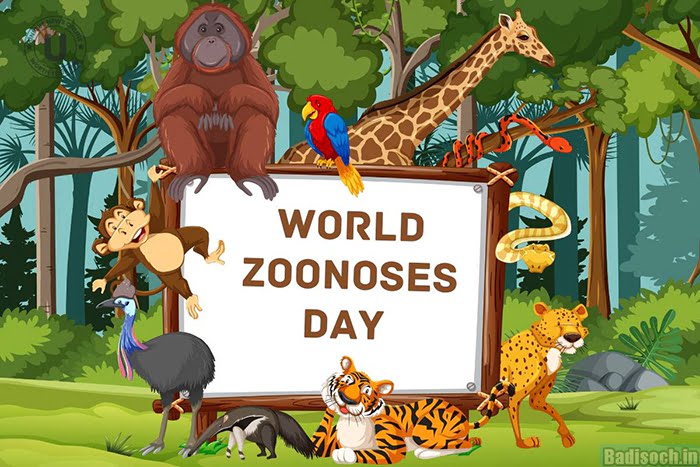World Zoonoses day Quotes:- On July 6 of each year, World Zoonoses Day is observed to honor the scientific achievement of the first vaccination against zoonotic disease. Zoonoses are infectious diseases spread between animals and humans by bacteria, viruses, and parasites. The first vaccine against the zoonotic disease rabies was successfully administered by Louis Pasteur on July 6, 1885. There are approximately 150 known zoonotic diseases at the moment. When people come into contact with infected live poultry, rodents, reptiles, amphibians, insects, and other domestic and wild animals, they run the risk of contracting zoonotic diseases.
The bite of a mosquito or tick is a common way for these diseases to spread. Here are a few World Zoonoses Day quotes and messages that you can read to learn more about this topic. Every July, we observe World Zoonoses Day. On this day, the sixth of July in 1885 is commemorated. It was on this day that Louis Pasteur successfully administered the first vaccine against the zoonotic disease Rabies. The World Zoonoses Day helps people become more aware of zoonotic diseases. Zoonoses are infectious diseases caused by bacteria, parasites, and viruses that spread from animals to humans and vice versa. Zoonoses can be passed on through direct or even indirect contact with animals.
World Zoonoses day Quotes 2024
World Zoonoses Day is observed on July 6th each year to raise awareness about zoonotic diseases and their impact on human and animal health. These diseases are caused by infectious agents that can be transmitted between animals and humans, such as rabies, Lyme disease, and avian flu. To prevent the spread of zoonotic diseases, it is important to practice good hygiene, wash your hands regularly, and avoid contact with wild or domestic animals that may carry these diseases. It is also important to keep pets healthy by getting them vaccinated and taking them for regular check-ups with a veterinarian.
World Zoonoses Day is celebrated on July 6th every year to raise awareness about zoonotic diseases and their prevention. Zoonotic diseases are those that can be transmitted from animals to humans. It is important to take precautions when handling animals or visiting places where animals are present, such as farms, zoos, and petting zoos. Some common zoonotic diseases include rabies, Lyme disease, and salmonella. To prevent the spread of these diseases, it is important to practice good hygiene, such as washing your hands after handling animals or their feces.
“The accelerating pace of zoonotic transmission of novel viruses into humans is attributable to anthropogenic epidemiologic factors. Only behavior modification or medical management of this future health burden will minimize the risks of future zoonoses for human populations.”
World Zoonoses day Quotes 2024 Overview
| Article Name | World Zoonoses day Quotes 2024 Wishes, Images, Messages, Shayari and Status |
| Category | Quotes |
 |
|
| Telegram | |
| World Zoonoses day Quotes | Click here |
World Zoonoses Day quotes and messages
- “The accelerating pace of zoonotic transmission of novel viruses into humans is attributable to anthropogenic epidemiologic factors. Only behavior modification or medical management of this future health burden will minimize the risks of future zoonoses for human populations.” ― Michael G Cordingley, Viruses: Agents of Evolutionary Invention
- World Zoonoses Day is important to every one of us because it brings to light the various diseases that animals can cause and the ways we can prevent diseases.
- Animal lovers and animal keepers can explain the importance of this day much better as world zoonotic diseases are usually originated in animals.
- World zoonoses day tells us how the health of animals is related to the health of humans.
- World Zoonoses Day gives us an idea of the fact how the health of humans is dependent on the health of animals.
- World zoonoses day is all about learning the ways to treat animals better so that animals remain healthy.
- World zoonoses day will keep you updated about the various measures you can take to keep your animals healthy and happy.
- World Zoonoses day celebrates the day the french biologist used the first vaccine against rabies.
- We all have a friend who is an animal lover and this day is particularly important to them so that they know how they might be affected by the bites and scratches of their precious animals.
- Diseases like rabies that are caused by animal bites are deadly and so we should learn more about them.
- Manage food properly by cooking properly and then storing the food appropriately to avoid zoonotic diseases.
- Always try to avoid scratches and bites from animals as zoonotic diseases are often caught from the bites and scratches from animals.
- Many people do not understand the term zoonotic diseases and for them, the celebration of this day is very knowledgeable.
- One way to celebrate the zoonotic day is by spreading the knowledge about this day with everybody.
- Zoonotic diseases are those diseases that are spread when human beings come in contact with any animal.
- Zoonotic diseases may be common but the term zoonosis is not so this day gives an opportunity to learn about this term better.
- Let us all celebrate world zoonoses day by learning more about the ways zoonose diseases spread and ways to prevent it.
- World zoonoses day promotes good health for both animals and human beings.
- There are many facts that we do not know about animals and the diseases that they can spread and the word zoonoses day provides us with the opportunity to know about all that.
- We all have a friend who is an animal lover and this day is particularly important to them so that they know how they might be affected by the bites and scratches of their precious animals.
- Diseases like rabies that are caused by animal bites are deadly and so we should learn more about them.
- This day is so important for everyone to understand more about the diseases caused by animals and the ways in which we can protect ourselves from the diseases.
World Zoonoses day Quotes Celebration 2024
- World Zoonoses day is the day that we celebrate to commemorate the invention of the vaccine against rabies.
- It is that time of the year when we exchange information about zoonose diseases with our friends and neighbors.
- This day focuses both on the health of animals and the health of human beings and also on the vaccines and medicines for animal bites.
- This day tells us to be more cautious with animals and to treat scratches and animal bites more seriously.
- Events and campaigns on world zoonoses day tell the people how to stay healthy and prevent these diseases.
- On this day, we get to know about the various ways to prevent the spreading of zoonotic diseases.
- We should be glad that a day like this is being celebrated and we are made aware of the various diseases and ways in which we can prevent them.
- Come along and join us in celebrating this day by sharing your knowledge about zoonotic diseases and becoming wiser in the process.
- The majority of the people come to know about three diseases like zoonotic diseases by the celebration of these events and so they are important to us.
- Zoonotic diseases spread by food and water that are already infected by germs.
- World zoonoses day tells us how the health of animals is related to the health of humans.
- World Zoonoses Day gives us an idea of the fact how the health of humans is dependent on the health of animals.
- World zoonoses day is all about learning the ways to treat animals better so that animals remain healthy.
- World zoonoses day will keep you updated about the various measures you can take to keep your animals healthy and happy.
- World Zoonoses day celebrates the day the french biologist used the first vaccine against rabies.
- Animal lovers and animal keepers can explain the importance of this day much better as world zoonotic diseases are usually originated in animals.
- Thanks to the celebration of this day, we can be enlightened about the various one hundred fifty diseases that are zoonotic diseases.
World Zoonoses day Quotes For Friends & Family
- World Zoonoses Day is important to every one of us because it brings to light the various diseases that animals can cause and the ways we can prevent the diseases.
- Avian influenza, Ebola virus, and West Nile virus are some zoonotic diseases the outbreak of which causes massive havoc among people.
- The 6th of July is basically celebrated to commemorate the great scientific achievement of the French biologist Louis Pasteur.
- The world Zoonoses day focuses on a lot of important things including emphasizing on the importance and necessity of veterinary doctors in our lives.
- World Zoonoses day celebrates Louis Pasteur’s achievement which was the first invention of the vaccine against rabies.
- We can understand the concept of the term Zoonoses if we break the word into zoon and nosos which means animal and ailments respectively.
- Let us wish everyone a happy world Zoonoses day and pray everyone gets informed about zoonotic diseases.
- Celebration of Zoonoses day is important as it informs the public about this disease and helps everyone get knowledge about this.
- When we all come together to celebrate this day we get to know the various ways we can prevent the spread of zoonotic diseases.
World Zoonoses day FAQ’S
Why is world zoonoses day celebrated?
World Zoonoses Day is observed on July 6th every year to raise awareness about zoonotic diseases and their impact on both human and animal health. The term zoonoses refers to infectious diseases that can be transmitted from animals to humans, and vice versa.
What is zoonoses day?
The World Zoonoses Day is celebrated to spread awareness on infectious diseases, which are collectively called as zoonotic diseases. It is celebrated in the honour of Louis Pasteur. He was a French biologist. He administered the first Rabies Vaccine to Joseph Meister on July 6, 1885.
What are zoonoses in humans?
Zoonotic diseases are infections that are spread between people and animals. These infections are caused by germs, such as viruses, bacteria, parasites, and fungi. Some can be severe and life threatening, such as rabies, and others may be milder and get better on their own.
What are two examples of zoonoses?
The zoonotic diseases of most concern in the U.S. are: Zoonotic influenza. Salmonellosis. West Nile virus.
What is viral zoonosis?
Zoonoses are diseases transmissible from vertebrate animals, other than humans, to people. Mammals, birds, reptiles, and probably amphibians are reservoirs or amplifying hosts for viral zoonoses. Frequently, these viruses cause little or no overt disease in their nonhuman vertebrate hosts.
Related post:-
Warren Buffett Quotes on Success


